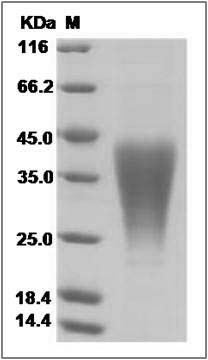-
Product Name
Mouse LIF recombinant protein
- Documents
-
Description
Leukemia inhibitory factor (LIF) is a pleiotropic glycoprotein belonging to the IL-6 family of cytokines. It’s involved in growth promotion and cell differentiation of different types of target cells, influence on bone metabolism, cachexia, neural development, embryogenesis and inflammation. LIF has potent proinflammatory property, being the inducer of the acute phase protein synthesis and affecting the cell recruitment into the area of damage or inflammation. LIF is also one of the cytokines that are capable to regulate the differentiation of embryonic stem cells, hematopoietic and neuronal cells. LIF binds to the specific LIF receptor (LIFR-α) which forms a heterodimer with a specific subunit common to all members of that family of receptors, the GP130 signal transducing subunit. This leads to activation of the JAK/STAT and MAPK cascades. Due to its polyfunctional activities, LIF is involved in the pathogenic events and development of many diseases of various origin.
-
Protein short names
RP23-329P17.1; HILDA; MLPLI; CDF; OTTMUSP00000005253; D FACTOR; DIA
-
Uniprot ID
P09056
-
Source/Expression Host
Human Cells
-
Expression Plasmid/cDNA
A DNA sequence encoding the mouse LIF (NP_032527.1) (Met1-Phe203) was expressed and purified.
-
Protein Species
Mouse
-
Molecular weight
The recombinant mouse LIF consists of 180 amino acids and predicts a molecular mass of 19.9 kDa. It migrates as approximately 34.1 kDa band in SDS-PAGE under reducing conditions.
-
Purity
> 95 % as determined by SDS-PAGE
-
Activity
Measured by its ability to inhibit the proliferation of M1 mouse myeloid leukemia cells.
The ED50 for this effect is typically 0.1-0.5 ng/mL. -
Validations

Mouse LIF Protein SDS-PAGE
Related Products / Services
Please note: All products are "FOR RESEARCH USE ONLY AND ARE NOT INTENDED FOR DIAGNOSTIC OR THERAPEUTIC USE"
